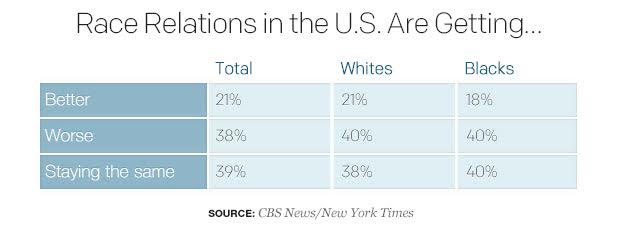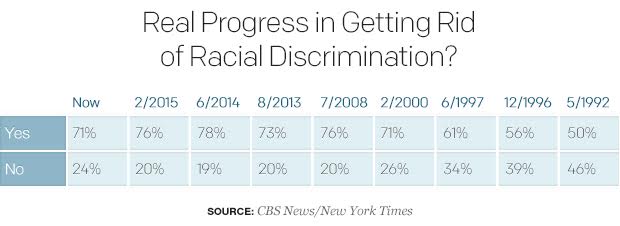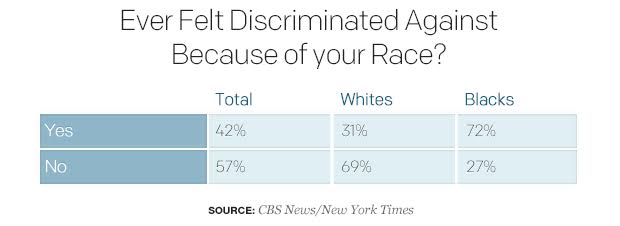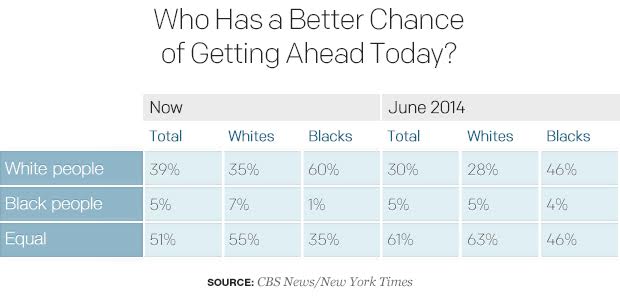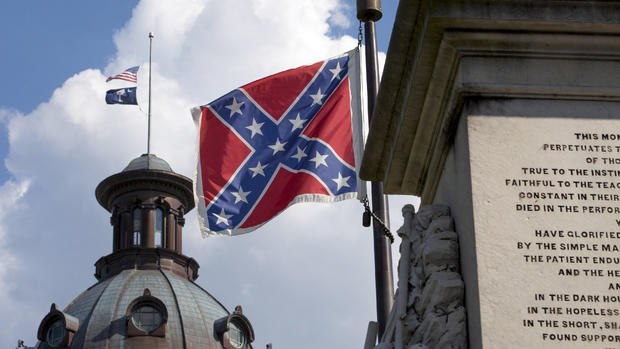Poll: What do Americans feel about race relations?
By Sarah Dutton, Jennifer De Pinto, Anthony Salvanto, and Fred Backus
Americans' negative views on the state of race relations in the U.S. persist, with nearly 6 in 10 Americans saying they're bad, according to a new CBS News/New York Times poll released Thursday.
Among those polled, blacks are more likely than whites to hold this view.
While most think there has been progress in getting rid of racial discrimination, many Americans say they personally know people who are prejudiced.
The poll findings suggest Barack Obama's presidency has not united whites and blacks. Just 15 percent of Americans say his presidency has brought these groups closer together. Forty-seven percent think his presidency has made no difference, while 34 percent think it has pushed whites and blacks further apart.
African Americans are more critical than whites of key aspects of society, including the criminal justice system and voting.
Nearly 8 in 10 African Americans believe the criminal justice system is biased against them, up from 61 percent in 2013.
At the ballot box, 50 percent of blacks think black Americans are more likely than whites to encounter problems when voting.
Whether at home, at work, or more generally, whites report far less interaction with blacks than blacks have with whites. And a majority of both blacks and whites think most people are uncomfortable having a conversation about race with someone of another race.
Overall Views of Race Relations
Current views of race relations, along with results from a CBS News/New York Times Poll conducted in April, represent the most pessimistic evaluations seen since the early 1990s.
More than half, 57 percent, of Americans now say that race relations in the U.S. are bad and just 37 percent say they are good. The poll doesn't show much hope for improvement either: just 21 percent say race relations are getting better, while 38 percent think they are getting worse.
Both blacks and whites view race relations negatively - although more blacks than whites say they are bad.
Positive opinions of race relations rose above 50 percent in the 2000s, and reached a high of 66 percent in April 2009, shortly after Barack Obama took office. But those positive assessments have not lasted: in mid-2014, after the conflicts between blacks and the police in Ferguson, Missouri, the percentage that said race relations are good dropped.
Both blacks and whites view race relations negatively - although more blacks (68 percent) than whites (56 percent) say they are bad.
The poll doesn't show much hope for improvement either; just 21 percent say race relations are getting better, while more -- 38 percent -- think they are getting worse.
But there is a positive note in the poll: Americans are more apt to rate race relations in their own community positively. While just 20 percent say they are bad, 77 percent say they are generally good. Blacks are more likely than whites to say race relations are bad where they live, although two-thirds say local race relations are good.
Race Relations in Your Community
While 71 percent of Americans say there has been real progress getting rid of racial discrimination since the 1960s, that is the lowest that percentage has been since 2000.
Again, the views of blacks and whites differ significantly.
Yet just 1 in 10 Americans - and 1 in 5 blacks - say that improving race relations is the single most important issue for the future of the U.S. More than 4 in 5 Americans, and 74 percent of blacks, say it is important, but so are other issues.
Prejudice and Discrimination
Blacks and whites report very different personal experiences when it comes to discrimination. Just 31 percent of whites say they can think of a specific instance where they felt discriminated against because of their race, but this percentage rises to 72 percent among African-Americans.
Many Americans say they personally know people who are prejudiced. Nearly two-thirds know white people who are prejudiced against blacks, while fewer, about half, say they know blacks who are prejudiced against whites. Americans age 45 and over are more likely than those who are younger to know whites who are prejudiced against blacks.
Just over half of Americans overall - and a similar percentage of whites - think members of both races have an equal chance of getting ahead in today's society. But views among blacks are different: 60 percent think whites have a better chance to get ahead, up from 46 percent a year ago.
While 58 percent of Americans support programs that help minorities get ahead, 35 percent oppose them. These figures have changed little over the years. However, there are sizable differences in support for such programs between whites and blacks; blacks are far more apt to say they favor these programs.
Personal Experiences: How Integrated are Blacks and Whites?
Whether at home, at work, or more generally, the poll finds whites report far less interaction with blacks, than blacks have with whites.
When white Americans are asked about the racial make-up of their community, a majority - 79 percent - say few or none of the people who live in their immediate area are black, and nearly 7 in 10 regularly come into contact with either few or no black people. Results are similar when asked about their workplace: 81 percent of whites currently working say few or none of their co-workers are black.
But African-Americans are more likely to say they encounter whites in all three areas measured in the poll. Forty-eight percent report that half or almost all of the people in their immediate area are white, 64 percent say that at least half of the people they come into regular contact with are white, and 71 percent say half or more of their co-workers are white.
Still, majorities of both whites and blacks say they have at least one close friend of another race.
Talking About Race
The poll also suggests Americans face difficulties talking about race.
Majorities of both blacks (71 percent) and whites (60 percent) think most Americans are uncomfortable discussing the issue of race with someone of another race. But they are much more positive about their own comfort level: most blacks and whites say they themselves are comfortable having a conversation about race with someone of another race.
Race Relations and the Obama Presidency
While Americans were optimistic about the state of race relations at the start of Barack Obama's presidency, this poll suggests that the nation's first black president has not been able to unite whites and blacks.
Just 15 percent of Americans think Barack Obama's presidency has brought whites and blacks closer together. Instead, 47 percent think his presidency has made no difference, while 34 percent think his presidency has pushed blacks and whites further apart.
Blacks (30 percent) are more likely than whites (11 percent) to think the Obama presidency has brought blacks and whites closer together, though about half of both groups think his presidency hasn't made much difference.
Americans give a mixed review to President Obama for his handling of race relations in the U.S., and white and black Americans assess his presidency differently on this measure. Overall, 46 percent of Americans approve of how Barack Obama is handling race relations, while 44 percent disapprove. Among whites, more disapprove (50 percent) than approve (40 percent), while blacks overwhelmingly approve (72 percent).
More specifically, although 62 percent of white Americans think the Obama administration's policies treat both blacks and whites equally, more than a quarter of whites (27 percent) think his policies favor blacks over whites, up from just 12 percent in 2010 - and this rises to 49 percent among whites who disapprove of the president's handling of race relations.
In contrast, 85 percent of blacks think the policies of the Obama administration favor both blacks and whites equally.
Still, 45 percent of Americans think President Obama has been judged more harshly because he is black; blacks (80 percent) are far more likely to think so than whites (37 percent).
And while many Americans remain critical of President Obama's handling of race relations, more Americans think the Democratic Party (44 percent) is more likely to improve race relations than the Republican Party (23 percent).
Race, the Criminal Justice System and the Police
Half of Americans now say that the criminal justice system in the U.S. is biased against blacks, up from 35 percent two years ago. This is the highest that figure has been since the question was first asked in 1994.
Among blacks, 77 percent say it is biased, up from 61 percent two years ago.
In comparison, just 6 percent of Americans say it is biased against whites; 26 percent say it is biased in favor of whites; and 59 percent say it treats them fairly.
Views of the police are similarly different depending on race. A sizable minority (41 percent) of Americans think the police are more apt to use deadly force against a black person - a figure that rises to 74 percent among blacks, and even higher to 83 percent among black men.
There have been a number of high profile deaths of blacks by police in recent months, and 38 percent of the public thinks the number of unarmed black people killed by police has increased in the past year; 64 percent of blacks concur.
While 3 in 4 Americans, and 82 percent of whites, say their local police make them feel mostly safe, some blacks have a different view. Fewer -- 58 percent -- say the police make them feel safe, and 37 percent say the police make them anxious.
The poll also suggests that whites and blacks have different experiences when it comes to their interactions with police. Few whites say they have been stopped by the police as a result of their race or ethnic background, but 41 percent of blacks say that has happened to them. These percentages have been consistent since 2000.
Perhaps even more striking is that more than six in 10 black men feel they have been stopped by police because of their race.
Voting in the U.S.
The poll included questions on voting difficulties and limits, and the results find whites and blacks again hold quite different views.
When it comes to voting, 7 in 10 white Americans think blacks and whites are treated the same, but 50 percent of blacks think black Americans are more likely to face problems voting than whites.
In recent years, some states and counties have pushed to shorten the voting hours and times available for people to vote early and absentee. Only 20 percent of whites think these reductions are attempts to suppress votes; this rises to 46 percent among blacks. Many don't know enough to say.
This poll was conducted by telephone July 14-19, 2015 among a random sample of 1,205 adults nationwide. Data collection was conducted on behalf of CBS News by SSRS of Media, PA. Phone numbers were dialed from random samples of both standard land-line and cell phones.
Additional interviews were conducted with African Americans, who had previously completed a survey as part of a random sample, to yield a sample size of 312 African Americans. 751 whites were interviewed. The combined African American and non-African American samples were weighted separately to match their group's population characteristics such as gender, age, education, region, marital status and phone use based on recent U.S. Census estimates.
The samples were then combined and weighted to the total U.S. adult population. The error due to sampling for results based on the entire sample could be plus or minus 3 percentage points. The error for subgroups may be higher. The margin of error for the sample of whites is 4 points and 8 points for African Americans. Interviews were conducted in English and Spanish. This poll release conforms to the Standards of Disclosure of the National Council on Public Polls.
